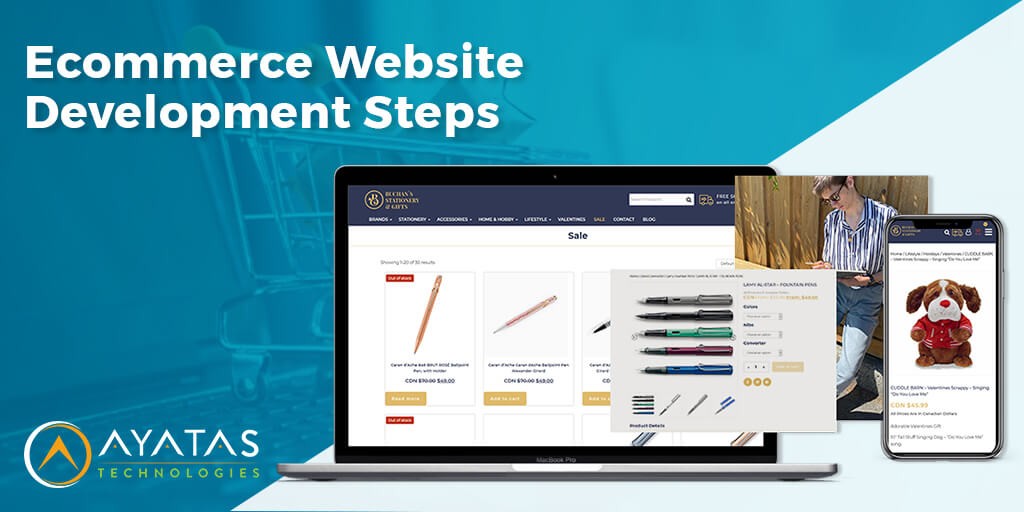
eCommerce Website Development Steps
The eCommerce industry has seen exceptional growth in recent years, and even if there are bumps in between, the industry has always bounced back and has been trending. The trend is expected to continue in the coming years, and entrepreneurs are now showing interest in the eCommerce industry. However, getting started with an eCommerce site is always considered the most daunting aspect of joining the world of online retail. Whether you are starting your first online store or planning to improve your existing store, read on to know some important eCommerce website development steps that will help you build a successful online store for your business.
What is eCommerce Website Development?
In eCommerce website development, there are many factors like website performance, speed of the site, and user experience to be considered. For developing the perfect online store, it is important to find the right developer who can meet all the challenges in developing a store for your business.
Role Of eCommerce Website Developer
For the success of an online store, the role of an eCommerce developer is crucial. Also, it ensures that potential customers can easily navigate through the online store and check out easily and safely. A developer’s work ranges from different skills, and the responsibilities are based on the type of online store you are planning to design.
Important Steps in eCommerce Website Development
Building an online store is just beyond understanding the market you are trying to capture, and you need to do lots of work on branding, web design, and content strategy. Here are some of the steps that can be helpful in eCommerce website development.
1. Evaluate Target Audience and Needs
The most crucial step in website development is evaluating the target audience and knowing the needs of the audience. Understanding customers’ needs mean identifying the demographic details and intending to reach all the potential customers. When you consider your customers, you’ll be able to create a site they want to come back to again and again.
2. Determine Your eCommerce Model
There are several business models available, but the main ones are B2B and B2C. In B2B, the companies provide services or products to other companies who need products. In B2C, the online shops interact with customers, and the products are directly sold to the customers by the merchants. Examples of B2C are Amazon and other famous online stores.
3. Responsive Web Design
As mobile usage increases, people are getting used to purchasing everything on the Internet using their mobiles. Your online store should be responsive so that it can be accessed from all types of devices, and at the same time, customers can also access the sites easily. Some companies are also making their mobile apps, and also the goal of delivering a consistent shopping experience to all customers is also established.
4. Choosing the Right eCommerce Platform
An eCommerce platform is a simple software that helps build your online store with the required products and all the transactions conducted by the customers. To begin with, as a business owner, you have to decide if you need to have a self-hosted or hosted platform with preferred maintenance plans. When choosing the eCommerce platform, keeping in mind the requirements of your business is also vital, and here are some of the other things to consider.
- ERP, CRM, Database compatibility, and integration
- Scope for eCommerce customization
- Integration of all payment gateways
5. Choose The Right Hosting Platform
Your hosting platform helps in determining the accessibility and performance of the site. Some of the key parameters to look for while choosing the hosting platform are
- The speed offered by the hosting platform
- Maximizing the Uptime
- Support Services Offered
- Scalability
- Security aspects of the platform
6. SEO Capabilities
In developing your online store, make sure that your developer knows how to make your site SEO friendly, which is one of the essential aspects of your website. Ranking highly on Google search engine results pages for relevant keywords helps drive traffic to your site from interested users searching online.
7. Setting Up Payment Options for Site
An eCommerce website developer can always help in integrating the right payment gateway for your online store. Most of the customers use various platforms for making payments, and as a business owner, you need to choose the payment gateways that support the target countries and customers.
8. Launching Your Website
Once your website is ready from stage to production, it is time to launch the website. Before launching a quick drive to ensure that website is running perfectly as per design and navigation.
9. Check List Before Launching
Here is a quick check-list to check before launching your online store
- Review all call to actions forms on all pages
- Test the checkout experience
- All the payment processing should be double-checked for security
- Make Sure all the product images are clear and well optimized for speed loading
- All the products have descriptions and categories
- Verify if your inventory is properly listed
- Test your promo codes
- Verify that your tax settings are as per the country you are doing business
Hire An eCommerce Development Team
eCommerce has now opened new opportunities for companies to start their online store, increase revenue, and reach more potential customers. Launching an online store is full of complexities. You need to find a reliable eCommerce development company to help evaluate tech aspects and take the necessary steps in designing an online store. At Ayatas Technologies, our professionals are experienced in making unique and tailor-made eCommerce systems for your business. If you are ready to start the eCommerce website development process for your business, contact us.



